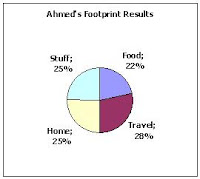
To calculate the carbon footprint I used the online website of footprint calculating http://footprint.wwf.org.uk. I answered different questions in four main categories, which are food, travel, home and stuff. My total footprint is 3.05 planets and the rest of my results are as following
Through our daily practices as individual, businesses and more, all contributes to the greenhouse gas emissions that cause climate change. Mohammed for example consumes 35% on food; in contrast, I consume 22% on the same category. In comparison, I have the highest consuming percentage 25% on the stuff category, while Abdulla has the lowest amount 15%. On the other hand, Nasser's is the highest in the group, he consume 40% in the travel category. I recommend that Nasser should change his habits in travelling for example, he can walk more; travel once a year, use bus or bicycle or use small car engine.
UAE has the largest per capita footprint on Earth because of energy use (Heroes of the UAE, 2009). UAE in the future will face a crisis in energy demand and climate change problems like hotter summers, lack of water and sea level rising (Heroes of the UAE, 2009). This is because UAE is a developing country that requires more construction, commerce, infrastructure, visitors, industry and transport. Moreover, the income of UAE citizens is very high which make them able to travel and buy more which increase their footprint and use of energy. In contrast, poor countries in Africa and Asia are the lowest countries in consuming energy because of the individual low income (Global Footprint Network, 2009). Individuals use less energy because they walk more, use buses, buy less, travel less, and use less electricity.
There are many simple things that we can do to reduce our carbon emissions. For example, on the home level, we can replace any light bulbs with compact fluorescent light bulbs to save 150 pound of carbon dioxide. Moreover, we have to turn off any electronic device, clean or replace air filter, set the refrigerator temperature and use microwaves and dishwashers more. On the travelling level, we can use cars less and walk more. On the food level, we can decrease the amount of meat use, eat more vegetarian food and buy local food. On the stuff level, we can use recycled stuff, buy reusable stuff, and use rechargeable batteries. Finally, people, countries and all businesses should work together hand in hand to reduce the amount of carbon used around the world to save the Earth and its resources to the next generations.
Resources:
Heroes of the UAE. 16 Apr. 2009,<
WWF Footprint Calculator. 16 Apr. 2009,<
Global Footprint Network, 16 Apr. 2009,<http://www.footprintnetwork.org>.







No comments:
Post a Comment